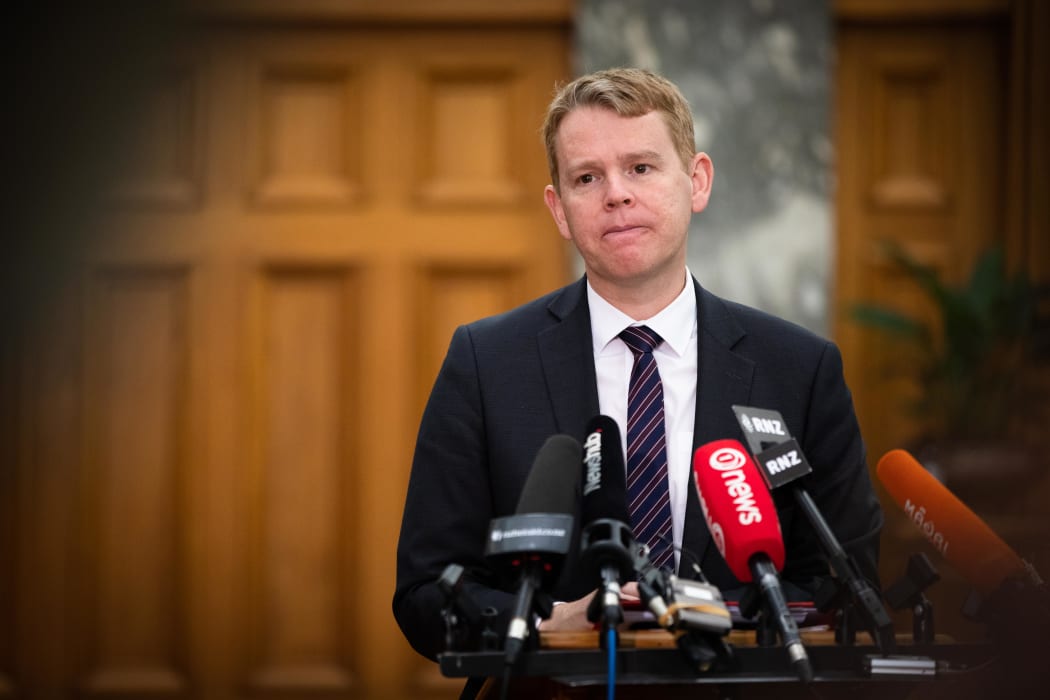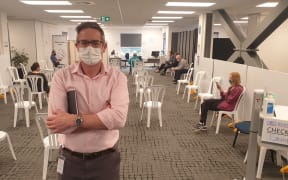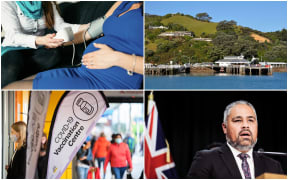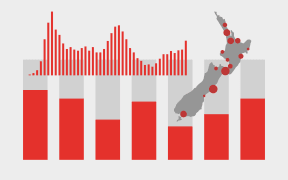The government is defending its continued Covid-19 restrictions in Auckland, saying the need hold off the virus' spread while vaccinating as many people as possible remains a priority.

Covid-19 Response Minister Chris Hipkins says National's position on Covid-19 restrictions remains shifting. Photo: RNZ / Angus Dreaver
Minister for Covid-19 Response Chris Hipkins told Morning Report the Delta outbreak would reach across the country at some point, but emphasised that holding that inevitability off until vaccination levels increased further remained the strategic health goal of government policy.
Yesterday, National leader Judith Collins criticised the continuing restrictions in Auckland, saying lack of detail on a plan to ease restrictions amounted to treating the public like children.
Today, National said it would set a six-week deadline for ending lockdowns and that a target of 85-90 percent vaccination rates were 'do-able' within that timeframe.
Prime Minister Jacinda Ardern on Monday revealed the city would remain in alert level 3, step 1 and signalled the government would reveal a Covid-19 protection plan on Friday.
However, Hipkins said holding back the spread of Covid-19 while the vaccination process was still underway remained the government's priority and said National's position was shifting and inconsistent.
"I think the urgency that you're now seeing is to find the unvaccinated people before Covid does. Covid-19 is now spreading," he said.
"We are continuing to try to suppress that while we get people vaccinated. I think it's really important that we give people the chance to be vaccinated. Covid is here.
"It is in New Zealand and it will find a way across the country at some point and we want to ensure people are vaccinated before that happens."
However, Hipkins warned case numbers were rising and would continue to do so. The Ministry of Health announced 94 new cases of Covid-19 in the community yesterday, the highest number since April last year.
"We are clearly in a part of this response where we are likely to see case numbers continue to increase for a period of time though, so we do need to be prepared for that," he said.
The government was realistically expecting case numbers to double roughly every two weeks, but said at this stage it was hard to put a figure on how many cases New Zealand would see daily, he added.
The minister acknowledged it could be "up in the high hundreds".
Covid-19 modeller Professor Michael Plank from Te Pūnaha Matatini told Morning Report at present trends daily case numbers could flatten out at 150 to 200 a day by the middle of next month.
But an explosive growth in cases as happened in New South Wales was also possible, he said.
"One of the dangers at the moment is if the contact tracing system really struggles to keep up with the number of cases that it's being asked to deal with the cases could really accelerate, and if that happens, we could see a much higher number of cases," he said.
Professor Plank said with hindsight Auckland may have left alert level 4 too early, but staying any longer may not have eliminated the outbreak.
"We may have ended up in a very similar situation to what we are now. It might have bought us a week, but it probably wouldn't have completely eliminated."
Hipkins said vaccination was playing a role in limiting the spread of the virus now and that contact tracers had not lost control of the outbreak.
"The modellers have different views on where we are likely to top out on a daily rate. It could be as low as 200, or it could be higher than that," he said.
"Vaccination is already having a role on our case numbers, so you'll see that other countries at this point on an outbreak have seen higher daily case numbers than the ones that we're seeing in New Zealand."
Schools reopening needed
Professor Plank said getting some some children back into classrooms needed to be a top priority as children were suffering from schools being closed for so long.

Photo: Supplied.
But he said it needed to happen safely and that meant having community transmission as low as possible, having parents and teachers vaccinated, and getting serious about school ventilation.
"This is the reality of living with Covid, it forces you into these really difficult decisions on a weekly basis," he said.
Hipkins gave more details of Auckland school reopening plans, ahead of a government announcement this afternoon. He said the issue of Covid-19 spreading in schools was one that kept him up at night.
"We've set out a bit of a pathway for schools," he said. "Schools won't all be opening at the same time.
"One of the things that we're acutely aware of is in primary school settings these will all become the highest concentration locations of people who are not vaccinated, because primary school children cannot be vaccinated.
"That does have significant risk associated with it. A spread of Delta in a primary school would spread very, very quickly and those students would be taking that virus home and potentially into unvaccinated pockets of the community, and that could be a cause of significant extra spread.
Hipkins said that was possible schools would open before children were vaccinated, but that secondary schools would be the more likely option in doing so.
"Secondary school students are our number one top priority. These are students who can be vaccinated and of course they have exams and assessments coming up."
The government was willing to look at putting artificial air filtration systems in come schools were there was essential need, but rolling out the technology across all classrooms was considered be too costly and, in many cases, an ineffective measure against the virus.
"We're talking about, across the country, over 35,000 classrooms," he said.
"It could be hundreds of millions of dollars if we put artificial air filtration systems in everyone of those. It's a very big price tag and in many cases those artificial air filtration systems are less effective than the natural filtration systems, if the windows and doors are left open."
He said rules mandatory mask-wearing in classrooms would be addressed this afternoon, but confirmed this would be likely 'in the early part of schools reopening".
Mandatory vaccination for secondary school students, however, was not the cards.
"We've always said you shouldn't lose your right to an education because you haven't been vaccinated," he said. "While we have a mandate for the staff to working in those environments, that doesn't apply to the students."
Hipkins also said assessments could be used for some NCE students who had their study time disrupted, based on an evidence portfolio that their school held of their performance. Internal exams would also be used instead of external examinations.
"The New Zealand Qualifications Authority will be making some further announcements this afternoon, but yes, we have been doing some thinking around how we can use NZQA's usual processes for exam disruption, which is typically applied at an individual level, how they can use those processes to further support the student," he said.




